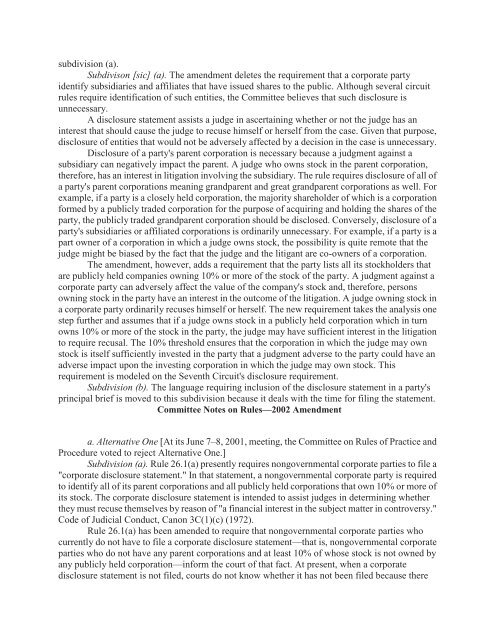Federal Rules of Appellate Procedure 2014-2015, 2014a
Federal Rules of Appellate Procedure 2014-2015, 2014a
Federal Rules of Appellate Procedure 2014-2015, 2014a
Create successful ePaper yourself
Turn your PDF publications into a flip-book with our unique Google optimized e-Paper software.
subdivision (a).<br />
Subdivison [sic] (a). The amendment deletes the requirement that a corporate party<br />
identify subsidiaries and affiliates that have issued shares to the public. Although several circuit<br />
rules require identification <strong>of</strong> such entities, the Committee believes that such disclosure is<br />
unnecessary.<br />
A disclosure statement assists a judge in ascertaining whether or not the judge has an<br />
interest that should cause the judge to recuse himself or herself from the case. Given that purpose,<br />
disclosure <strong>of</strong> entities that would not be adversely affected by a decision in the case is unnecessary.<br />
Disclosure <strong>of</strong> a party's parent corporation is necessary because a judgment against a<br />
subsidiary can negatively impact the parent. A judge who owns stock in the parent corporation,<br />
therefore, has an interest in litigation involving the subsidiary. The rule requires disclosure <strong>of</strong> all <strong>of</strong><br />
a party's parent corporations meaning grandparent and great grandparent corporations as well. For<br />
example, if a party is a closely held corporation, the majority shareholder <strong>of</strong> which is a corporation<br />
formed by a publicly traded corporation for the purpose <strong>of</strong> acquiring and holding the shares <strong>of</strong> the<br />
party, the publicly traded grandparent corporation should be disclosed. Conversely, disclosure <strong>of</strong> a<br />
party's subsidiaries or affiliated corporations is ordinarily unnecessary. For example, if a party is a<br />
part owner <strong>of</strong> a corporation in which a judge owns stock, the possibility is quite remote that the<br />
judge might be biased by the fact that the judge and the litigant are co-owners <strong>of</strong> a corporation.<br />
The amendment, however, adds a requirement that the party lists all its stockholders that<br />
are publicly held companies owning 10% or more <strong>of</strong> the stock <strong>of</strong> the party. A judgment against a<br />
corporate party can adversely affect the value <strong>of</strong> the company's stock and, therefore, persons<br />
owning stock in the party have an interest in the outcome <strong>of</strong> the litigation. A judge owning stock in<br />
a corporate party ordinarily recuses himself or herself. The new requirement takes the analysis one<br />
step further and assumes that if a judge owns stock in a publicly held corporation which in turn<br />
owns 10% or more <strong>of</strong> the stock in the party, the judge may have sufficient interest in the litigation<br />
to require recusal. The 10% threshold ensures that the corporation in which the judge may own<br />
stock is itself sufficiently invested in the party that a judgment adverse to the party could have an<br />
adverse impact upon the investing corporation in which the judge may own stock. This<br />
requirement is modeled on the Seventh Circuit's disclosure requirement.<br />
Subdivision (b). The language requiring inclusion <strong>of</strong> the disclosure statement in a party's<br />
principal brief is moved to this subdivision because it deals with the time for filing the statement.<br />
Committee Notes on <strong>Rules</strong>—2002 Amendment<br />
a. Alternative One [At its June 7–8, 2001, meeting, the Committee on <strong>Rules</strong> <strong>of</strong> Practice and<br />
<strong>Procedure</strong> voted to reject Alternative One.]<br />
Subdivision (a). Rule 26.1(a) presently requires nongovernmental corporate parties to file a<br />
"corporate disclosure statement." In that statement, a nongovernmental corporate party is required<br />
to identify all <strong>of</strong> its parent corporations and all publicly held corporations that own 10% or more <strong>of</strong><br />
its stock. The corporate disclosure statement is intended to assist judges in determining whether<br />
they must recuse themselves by reason <strong>of</strong> "a financial interest in the subject matter in controversy."<br />
Code <strong>of</strong> Judicial Conduct, Canon 3C(1)(c) (1972).<br />
Rule 26.1(a) has been amended to require that nongovernmental corporate parties who<br />
currently do not have to file a corporate disclosure statement—that is, nongovernmental corporate<br />
parties who do not have any parent corporations and at least 10% <strong>of</strong> whose stock is not owned by<br />
any publicly held corporation—inform the court <strong>of</strong> that fact. At present, when a corporate<br />
disclosure statement is not filed, courts do not know whether it has not been filed because there


















